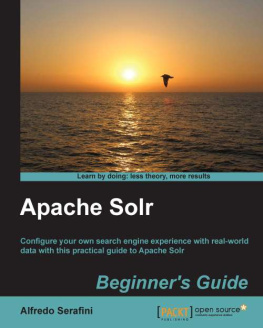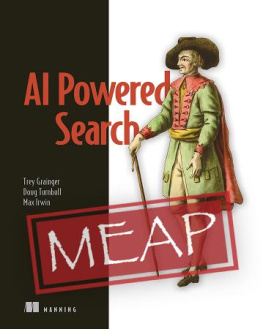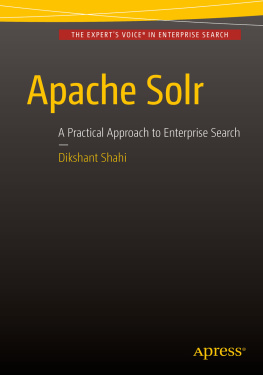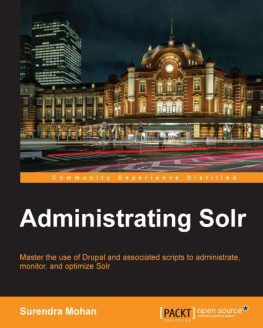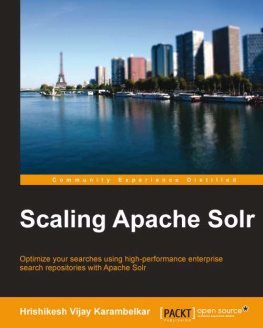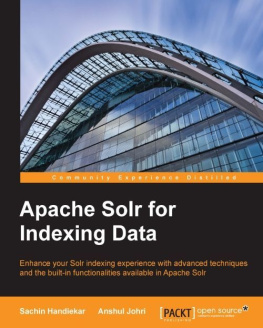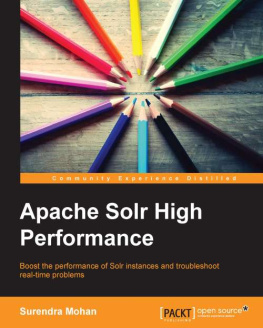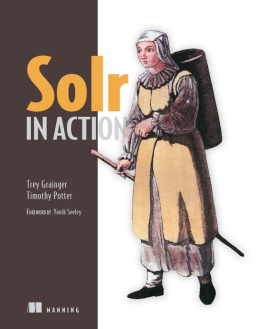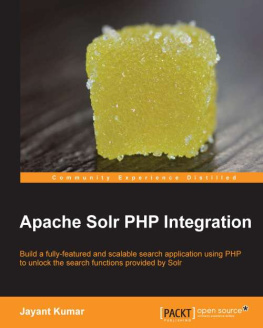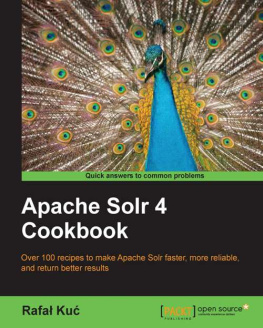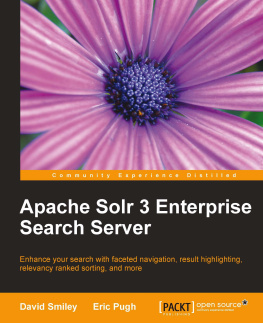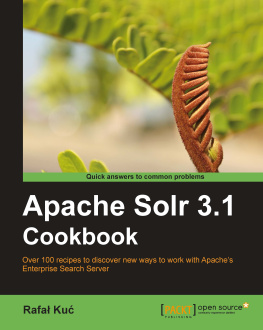Serafini - Apache Solr for beginner’s
Here you can read online Serafini - Apache Solr for beginner’s full text of the book (entire story) in english for free. Download pdf and epub, get meaning, cover and reviews about this ebook. City: Birmingham, year: 2013, publisher: Packt Publishing, genre: Home and family. Description of the work, (preface) as well as reviews are available. Best literature library LitArk.com created for fans of good reading and offers a wide selection of genres:
Romance novel
Science fiction
Adventure
Detective
Science
History
Home and family
Prose
Art
Politics
Computer
Non-fiction
Religion
Business
Children
Humor
Choose a favorite category and find really read worthwhile books. Enjoy immersion in the world of imagination, feel the emotions of the characters or learn something new for yourself, make an fascinating discovery.
- Book:Apache Solr for beginner’s
- Author:
- Publisher:Packt Publishing
- Genre:
- Year:2013
- City:Birmingham
- Rating:4 / 5
- Favourites:Add to favourites
- Your mark:
Apache Solr for beginner’s: summary, description and annotation
We offer to read an annotation, description, summary or preface (depends on what the author of the book "Apache Solr for beginner’s" wrote himself). If you haven't found the necessary information about the book — write in the comments, we will try to find it.
Where do you start with Apache Soir? Wed suggest with this book, which assumes no prior knowledge and takes you step by careful step through all the essentials, putting you on the road towards successful implementation.
Overview
- Learn to use Solr in real-world contexts, even if you are not a programmer, using simple configuration examples
- Define simple configurations for searching data in several ways in your specific context, from suggestions to advanced faceted navigation
- Teaches you in an easy-to-follow style, full of examples, illustrations, and tips to suit the demands of beginners
In Detail
With over 40 billion web pages, the importance of optimizing a search engines performance is essential.
Solr is an open source enterprise search platform from the Apache Lucene project. Full-text search, faceted search, hit highlighting, dynamic clustering, database integration, and rich document handling are just some of its many features. Solr is highly scalable thanks to its distributed search and index replication.
Solr is written in Java and runs as a standalone full-text search server within a servlet container such as Apache Tomcat or Jetty. Solr uses the Lucene Java search library at its core for full-text indexing and search, and has REST-like HTTP/XML and JSON APIs that make it usable with most popular programming languages. Solrs powerful external configuration allows it to be tailored to many types of application without Java coding, and it has a plugin architecture to support more advanced customization.
With Apache Solr Beginners Guide you will learn how to configure your own search engine experience. Using real data as an example, you will have the chance to start writing step-by-step, simple, real-world configurations and understand when and where to adopt this technology.
Apache Solr Beginners Guide will start by letting you explore a simple search over real data. You will then go through a step-by-step description that gives you the chance to explore several practical features. At the end of the book you will see how Solr is used in different real-world contexts.
Using data from public domains like DBpedia, you will define several different configurations, exploring some of the most interesting Solr features, such as faceted search and navigation, auto-suggestion, and rich document indexing. You will see how to configure different analysers for handling different data types, without programming.
You will learn the basics of Solr, focusing on real-world examples and practical configurations.
What you will learn from this book
- Understand what is full-text search and a faceted navigation are and when to use them
- Install and use Solr for testing
- Write your own configurations for the Solr index incrementally and test them with the Solr web UI
- Learn how to test a Solr running instance using cURL with different formats, like XML, JSON, and so on
- Construe your data and define the entities to be indexed in Solr
- Examine text and make auto-suggestions
- Index data using various formats and various data sources, and learn how to expose data in various formats
- Start using Solr in contexts like Open Data and Linked Data
- Use Solr for expanding your data with resources from public, well-known knowledge bases
Approach
Written in a friendly, example-driven format, the book includes plenty of step-by-step instructions and examples that are designed to help you get started with Apache Solr.
Serafini: author's other books
Who wrote Apache Solr for beginner’s? Find out the surname, the name of the author of the book and a list of all author's works by series.

